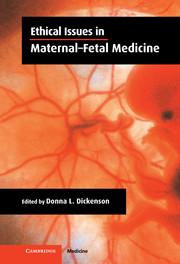Book contents
- Frontmatter
- Contents
- List of contributors
- Acknowledgements
- 1 Introduction: recent debates in maternal–fetal medicine – what are the ethical questions?
- 2 Overview: a framework for reproductive ethics
- I GENERIC ISSUES IN PREGNANCY
- 3 Multicultural issues in maternal–fetal medicine
- 4 HIV in pregnancy: ethical issues in screening and therapeutic research
- 5 Genetic screening: should parents seek to perfect their children genetically?
- 6 Is there a duty not to reproduce?
- 7 Between fathers and fetuses: the social construction of male reproduction and the politics of fetal harm
- 8 Restricting the freedom of pregnant women
- II INCEPTION OF PREGNANCY: NEW REPRODUCTIVE TECHNOLOGIES
- III FIRST AND SECOND TRIMESTER
- IV THIRD TRIMESTER
- V NEONATAL LIFE
- Index
3 - Multicultural issues in maternal–fetal medicine
from I - GENERIC ISSUES IN PREGNANCY
Published online by Cambridge University Press: 29 September 2009
- Frontmatter
- Contents
- List of contributors
- Acknowledgements
- 1 Introduction: recent debates in maternal–fetal medicine – what are the ethical questions?
- 2 Overview: a framework for reproductive ethics
- I GENERIC ISSUES IN PREGNANCY
- 3 Multicultural issues in maternal–fetal medicine
- 4 HIV in pregnancy: ethical issues in screening and therapeutic research
- 5 Genetic screening: should parents seek to perfect their children genetically?
- 6 Is there a duty not to reproduce?
- 7 Between fathers and fetuses: the social construction of male reproduction and the politics of fetal harm
- 8 Restricting the freedom of pregnant women
- II INCEPTION OF PREGNANCY: NEW REPRODUCTIVE TECHNOLOGIES
- III FIRST AND SECOND TRIMESTER
- IV THIRD TRIMESTER
- V NEONATAL LIFE
- Index
Summary
Introduction
This chapter sets the debate between universalization of ethical norms and relativist demand for cultural autonomy in the matters of morals within the practical context of maternal–fetal medicine and reproductive health care. The debate between universalism and relativism is particularly central in the field of maternal–fetal medicine, because the universal protection of individual's rights and such values as equality and personal autonomy are usually the very basis for the improvement of women's and children's health around the world. Nevertheless, in many cultures, particularly in many traditional (sometimes also called communitarian) communities, these values are rejected and individual rights are systematically denied to women and children – often in the name of cultural integrity, customary values and the defence of collective rights, all within the same human rights discourse. This chapter attempts to give a theoretical background that can help health care professionals make difficult ethical choices in multicultural environments. Most of the practical examples mentioned in this article are from Tanzania, for the simple reason that during my visiting lectureship at the University of Dar es Salaam these local customs, the problems involved in them and attempts to solve these problems are the ones that have become most familiar to me.
The thorny ethical dilemma for the health care professionals working in an international or widely multicultural environment is the following.
- Type
- Chapter
- Information
- Ethical Issues in Maternal-Fetal Medicine , pp. 39 - 60Publisher: Cambridge University PressPrint publication year: 2002
- 2
- Cited by



